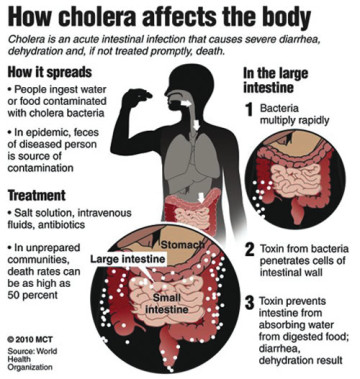Cholera is deadly, but preventable
Sometime in February, there were reports of cholera outbreaks variously in Igbomotoru II, Southern Ijaw Local Government Area of Bayelsa State; and also in Innoma community in Anambra West Local Government Area of Anambra State.
Again in April, at least 30 people were confirmed to have died during another cholera outbreak in Isoko South community, Delta State.
The Chief Epidemiologist at the Delta State Ministry of Health, Mr. Steven Ofili, attributes the outbreak to the pollution of the community’s water sources.
Experts describe cholera as an infection of the intestines which happens when an individual accidentally swallows the bacterium Vibrio cholera, which is usually present in water or food that has been contaminated by faeces.
Physicians say cholera thrives in dirty environment and in places where clean water is lacking. Worse still, environmentalists say, cholera can become epidemic in places where there are no proper waste disposal system.
Massive displacement of people, which may force the displaced people to live in crowded spaces, can also lead to cholera outbreak if proper hygiene practices are neglected.
The World Health Organisation notes that where the provision of potable water and sanitation is challenging, the risk factor will be higher.
General Physician, Dr. Chris Olusanya, says the most severe form of cholera is characterised by a sudden onset of acute watery diarrhoea that can lead to death because of the severe dehydration that usually follows frequent bathroom visits.
Although cholera is as preventable as it is easy to treat, it can cause watery diarrhoea and vomiting, making people who have it to become dehydrated very quickly.
In severe cases of dehydration, it can result in serious health problems if it is not treated with the urgency it deserves, Olusanya warns.
He says it can result in seizures and kidney failure. In worst case scenario, the physician says, an infected person who doesn’t get the much needed medical attention may die.
The incubation period of the cholera bacterium is very short, as it can become active within two hours of infection; while in some cases, the incubation period could be about five days.
Olusanya says this short incubation period “enhances the potentially explosive pattern of outbreaks, and the number of cases can rise very quickly.”
The WHO notes that about three out of four people infected with cholera do not develop any symptoms, though the pathogens may stay in their faeces for between seven and 14 days, during which they will contaminate the environment when they poop indiscriminately, which may lead to infecting other individuals.
Cholera is extremely severe and harmful in its effects. It is no respecter of age or sex, as it affects children and adults, men and women. Indeed, paediatricians warn that cholera is most common in children under the age of five years, killing them fast where there’s no care.
And, unlike other diarrhoeal diseases, cholera can kill healthy adults within hours. And when it afflicts individuals with lower or compromised immunity, such as malnourished children or people living with HIV, they are at greater risk of death if medical care is not sought and received immediately.
Globally, WHO says, cholera kills between 28,000 and 142,000 people every year. And that tells you that cholera is not the kind of infection anyone can treat at home!
Take caution
People contact cholera through various ways, Olusanya says. According to him, those who get their water from the public water supply must be careful, because if they drink water that comes through burst pipes, it may have become infected long before it gets to their table.
The same caution is necessary if you buy ice block from retailers for use at home. Olusanya warns that ice block that is made with ‘suspicious’ water may contain cholera bacterium, which will definitely infect anyone who takes it.
And if you are the type that buys foods and drinks indiscriminately from street vendors, you may as well be exposing yourself and anyone around you to the possibility of cholera infection!
And though we have heard that vegetables and fruits are good for us, we must be careful of the way we handle our fruits and vegetables!
Nutritionists say vegetables that are grown with water that has been contaminated with faeces pose serious danger to the consumer. But since you may not know the source of your vegetables, you are advised to handle with care.
If you must eat raw vegetables such as cabbage, lettuce, carrots, etc., Olusanya says you should soak them for about five minutes in vinegar-water solution. You should do the same for fruits, he counsels.
Mercifully, Sushi is not entirely popular in this part of the world. But even then, handle your seafood with care! This is because raw or undercooked fish and seafood that may have been caught in waters polluted with sewage pose serious threat of cholera to anyone who eats them.
Know the symptoms
The following are the unmistakable symptoms to watch out for:
- Watery diarrhoea with a fishy smell
- Stomach cramps
- Dry mouth and skin
- Rapid heart rate
- Loss of skin elasticity (the ability to return to original position quickly if pinched)
- Excessive thirst
- Dehydration
- Low urine output
- Leg cramps and muscle cramps
- Nausea and vomiting
- Low blood pressure
- Exhaustion and weakness
- Sunken eyes
- Irritability and restlessness
- Dry mucous membranes, including the inside of the mouth, throat, nose, and eyelids
PUNCH.








